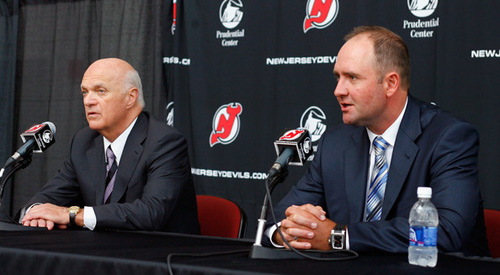
Following in Lou’s footsteps: The NHL head coach turnstile
Coaching at the National Hockey League level has never been easy, but the roles that individual bench staffs play with their teams have always been largely influenced by the cultures of the organizations for whom they work, almost as much as their production on the ice.
Just look at the New Jersey Devils and the culture established by general manager Lou Lamoriello when it comes to the bench boss of the franchise.
Since taking the reins as president – and consequently general manager – of the club before the 1987-88 season, the Rhode Island native has managed to switch things up behind the bench a total of 19 times.
Jacques Lemaire, one of the game’s greatest tactical minds, has been the head honcho on three separate occasions, while Canadiens legend Larry Robinson and Lamoriello himself have each served twice.
Last season, Lamoriello named long-time Devils winger John MacLean head coach after he’d apprenticed as coach of the club’s American Hockey League affiliate team in Lowell, MA.
Talk about a guy that bleeds black and red. MacLean had spent a total of 16 seasons – 15 as a player, one as a coach – with the organization before landing the position. However, all it took were a measly 33 games for Lamoriello to dismiss the long-time player/coach.
[php snippet=1]
The year 2010 wasn’t a great one for the Devils. The backlash after the signing of Ilya Kovalchuk was heavy and unkind, and the team’s best forward, Zach Parise, played just 13 games before succumbing to a season-ending knee injury. These, and various other factors, resulted in the Devils missing the playoffs for the first time since the 1995-96 season.
Now a year removed from the Kovalchuk fiasco and with a healthy Parise back in the lineup, new head coach Peter DeBoer has reasons to succeed but, unfortunately, not many reasons to fail.
The finger can’t be pointed solely at Lamoriello when talking about potential early deployment of coaches at the NHL level. Across the continent are the Los Angeles Kings – a team that may very well can Terry Murray if his squad does not make some serious noise in the 2011-12 campaign, his fourth with the club.
Two impressive teams in as many seasons have been put together by Kings general manager Dean Lombardi, with little to show. Is their time now or will it all blow up in Lombardi and Murray’s faces? Trading top prospect Brayden Schenn to the Philadelphia Flyers in exchange for former Flyer captain Mike Richards surely will have a major impact on that.
When a general manager spends his summer sprinkling in a reliable veteran presence with an excellent young core, the coaching staff must know that the time is now. If the Kings staff isn’t a significant part of the triumvirate by the All-Star break, Murray may find himself knocking on his brother’s door in Ottawa looking for a new gig.
What would a conversation about a tight leash be without the mention of the Toronto Maple Leafs and Ron Wilson? Seven years have passed without a playoff appearance for the Leafs; the last three being with Wilson coaching. Though general manager Brian Burke is not showing impatience, logic tells the hockey community that huge strides have to be made by Wilson’s crew, and soon.
This season, there are individuals outside of the Air Canada Centre offices that believe the Leafs can make some noise. They have their goalie in James Reimer and veteran center in Tim Connolly, their young players are a little older, and they possess a defense that is debatably at its strongest point in years.
A key factor in this discussion is that Wilson enters the 2011-12 season in the final year of his contract. Being below the eighth-place line may finally force Burke to fire his fellow Providence College alumni and find a new fish for one of the toughest jobs in hockey.
As rookie camps begin to gear up and the pressure on NHL coaching staffs build steam, the room for error begins to narrow. And with the influx of very qualified former coaches looking for work, as well as commendable prospects in the AHL ranks, a general manager may find it very easy to replace his coach as a result of a subpar first half.
[php snippet=1]

